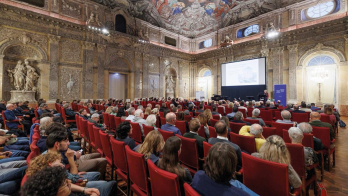
Basic science does not usually have immediate benefits for industry or the economic world in general, and
delays in visible return are often difficult to reconcile with the short-term expectations of market-driven activities.
However, during the last decade the jobs that have been generated by start-up companies have injected extra liquidity into a once stagnant labour market. Since the early 1970s, universities and their incubator schemes, particularly in the US, have been supporting young entrepreneurs. This new culture has led to the establishment of a large number of start-up companies. However, the gold rush aspects of such mass migration can also have negative implications.
Aspects of this new scene were reflected in a Basic Science and Entrepreneurship workshop that was held during the recent IEEE Nuclear Science Symposium and Medical Imaging Conference in Lyon, France, and organized by François Bourgeois, CERN; Alan Jeavons, Oxford Positron Systems (UK); Yves Jongen, Ion Beam Applications (Belgium); and Gert Muehllehner, UGM (US).
The workshop aimed to highlight the factors that are necessary for success in entrepreneurship and the best practices to be adopted in the research and development environment. During a session entitled “The do’s and the don’ts of entrepreneurship”, five founders of spin-off companies reported on the problems they faced when developing their businesses. In addition to the well known problems – establishment of a business plan, funding, marketing and growth – the panel discussion gave useful indications on requirements of particular relevance to scientist-entrepreneurs: to match a high-tech product with market and customer needs; to team up with third parties knowledgeable in business and administration (e.g. local business schools); and to know how to produce a business plan.
As Muehllehner said: “To succeed, the scientist-entrepreneur needs to have a finished product, an established market, a team of people (finance, marketing and sales) and a source of money. Failing to have one of these [means] the chance of success drops to 80%; failing to have two [means] it is only 25%; and don’t even start if you’re missing more than two.”
During the session entitled “How to turn a scientist into an entrepreneur”, representatives of major research and development laboratories and European institutes presented their most recent initiatives. The oral presentations gave special attention to training actions, support given to entrepreneurs (identification of nascent technologies, intellectual property, seed capital and funding), and measures aimed at fostering a more entrepreneurial spirit.
Panel discussions agreed that there was substantial value in the direct exploitation of technology as compared to licensing. The need to foster an entrepreneurial spirit among scientists and their evident willingness to transfer technology was also examined. The raising of their awareness of the value of intellectual property and of exploiting its worth, together with the need for networking with other entrepreneurs and venture capitalists, were seen as key measures likely to foster a change of culture, at least in Europe.







